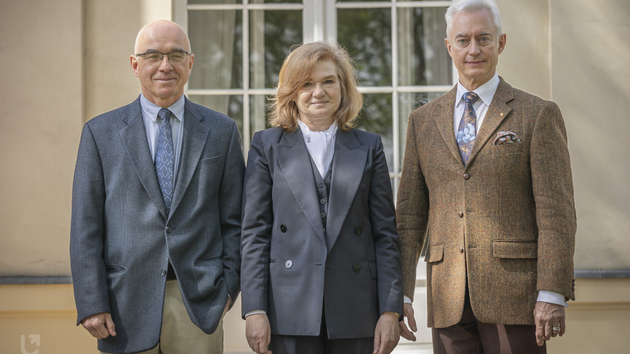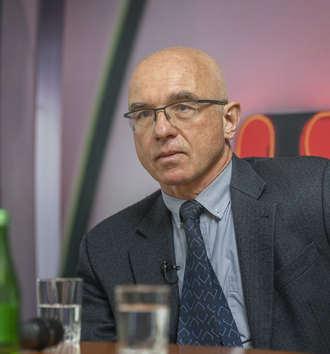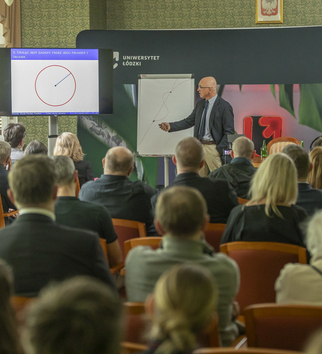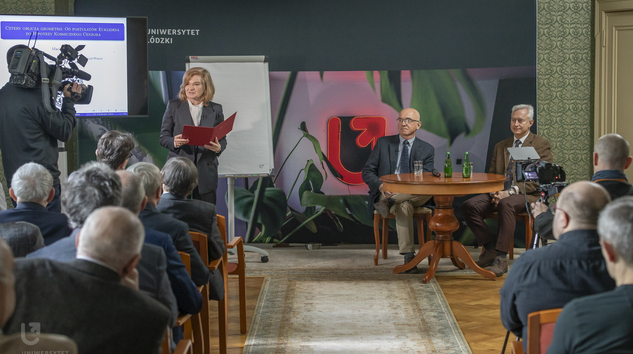Full photo report of the event
Maciej Dunajski is Professor of Mathematical Physics and a Fellow and a Graduate Tutor at Clare College, Cambridge University. He received a PhD in Mathematics from Oxford University, where he conducted research in the group of Roger Penrose – a winner of the Nobel Prize in Physics in 2020. He obtained his habilitation and the title of Professor at the University of Lodz. He has lectured e.g. at University of California, Berkeley, Princeton University and Harvard University.
Prof. Dunajski is the author of over 80 scientific papers and monographs in the field of geometry, general relativity and soliton theory. He is also the author of the popular science book "Geometry: A Very Short Introduction”. In 2009, Prof. Dunajski, together with Robert Bryant and Mike Eastwood, found a solution to the 19th-century metrizability problem, which had been open for more than 120 years. In 2022, the London Mathematical Society awarded Maciej Dunajski the prestigious Atiyah’s Scholarship. In 2023, Professor Dunajski was awarded top prize from the Gravity Research Foundation.
He is also a modest and an open-minded man. In an interview before the lecture, when asked about what he would like to say to Polish scientists, and in particular to scientists from Lodz, Prof. Dunajski said:
First of all, I would like to express my gratitude to the scientists from Lodz. I wouldn't be where I am today if it wasn't for my teachers from the University of Lodz and the Lodz University of Technology. We have, and certainly had in the 90s, outstanding, world-class experts. I've been living outside the country for over 25 years and I'm not very familiar with the science policy of universities. However, I believe that if you let people do what they want to do scientifically, without imposing a number of rules and regulations on them, that's the best way to go. I wish them to have scientific freedom to work on whatever they want to work on.
The Thursday meeting began with a welcome speech by Prof. Elżbieta Żądzińska, Rector of the University of Lodz. The event at the Biedermann’s Palace gathered many distinguished guests such as Prof. Rafał Matera – Rector-elect of the University of Lodz, researchers from Lodz and Polish research institutions, students from High School No. 1 in Lodz, which Prof. Dunajski graduated from, as well as his friends and closest family.
The introduction to the series of Rector's Lectures was made by Prof. Aleksander Welfe, the coordinator of this unique initiative, which has been successfully taking place at the University of Lodz for 15 years:
When I presented this idea to Prof. Włodzimierz Nykiel, the then Rector of the University of Lodz, 15 years ago it was quite a new idea, although modelled on very similar ones implemented at great universities around the world. However, I never thought that the Rector's Lectures would develop as they did. Well, the first Rector's Lecture delivered 14 years ago in May 2010 was a lecture given by Sir Roger Penrose, who Professor Dunajski has cooperated with (...) Other Nobel Prize winners, such as Prof. Svante Pääbo, who received the Nobel Prize in Medicine right after his speech in Lodz in 2022, also performed as part of the Rector's Lectures. There were also great politicians and social activists, such as Szewach Weiss, Władysław Bartoszewski, Jerzy Buzek. We've also had two Presidents: Joachim Gauck and Václav Klaus. And this is what the Rector's Lectures series is all about!
As part of the series, outstanding scientists, great politicians, social activists and economic activists deliver lectures at the University of Lodz. A full list of previous guests of our university can be found on the page dedicated to the Rector's Lectures series.
I can proudly say that such an initiative is not implemented at any other Polish university!
– concluded Prof. Aleksander Welfe, the series coordinator.
The lecture by Professor Maciej Dunajski was already the 31st lecture delivered as part of the above-mentioned initiative. We encourage you to watch and listen to the speech entitled: "The Four Faces of Geometry: From Euclid's Postulates to the Cosmic Censor Hypothesis".
We asked Prof. Piotr Kosiński, Head of the Sub-department of Mathematical Methods at the Faculty of Physics and Applied Informatics of the University of Lodz, to comment on the speech:
"Starting from deep antiquity (Egypt), where geometry was treated as empirical knowledge, of a purely utilitarian nature (the first face of geometry), Prof. Dunajski sketched the process of its transformation into a model of abstract deductive science, which culminated in the famous Elements of Euclid (the second face). He gave the beautiful proof of Pythagorean Theorem as an example of geometrical reasoning. Then he went on to discuss the problem of the independence of the so-called Euclid's fifth postulate (Parallel postulate) and the centuries-long attempts to derive it from the other postulates. This naturally led to the third face of geometry – non-Euclidean geometry. Prof. Dunajski sketched a method to prove the independence of the fifth postulate by showing how the geometry of sections of circles, drawn on a circle with a unit radius, can be treated as an example of non-Euclidean geometry. He illustrated the considerations regarding this geometry with a discussion of the so-called “tiling” problem, i.e. covering a (non-Euclidean) plane with identical polygons. He also mentioned that non-Euclidean geometry was the inspiration for the artistic work of the Dutch painter and printmaker Maurits Escher. Escher drew inspiration from mathematics, and the model of non-Euclidean geometry, based on a construction using a subset of the Euclidean plane, is of remarkable aesthetic value.
The fourth face of geometry is its relationship to one of the most beautiful physical theories – the general theory of relativity. Prof. Dunajski gave an illustrative definition of the curvature of space-time and explained that Einstein's equation was a relationship between the curvature and the masses of gravitating bodies. He described the important achievement of the Nobel Prize winner Roger Penrose, who showed that the theory of relativity inevitably leads to the conclusion that there are so-called singularities, i.e. places where the known laws of physics break down. Finally, he discussed the so-called cosmic censor hypothesis, which postulates that such singularities, although they exist, are always hidden from the eyes of observers by the so-called event horizon.
The lecture, in accordance with Einstein's principle that if you understand something, you can explain it in a simple way, was available to listeners who were not mathematicians or physicists."
The meeting at the Biedermann’s Palace ended with a series of questions and a discussion with the audience. The programme of Prof. Maciej Dunajski's stay in Lodz also included an afternoon visit to the High School No 1, which he graduated from.
The mission of the University of Lodz is to conduct reliable research and actively disseminate facts and research results so as to wisely educate future generations, be useful to society and courageously respond to the challenges of the modern world. Scientific excellence is always our best compass. Our values include: courage, curiosity, commitment, cooperation and respect.
Commentary on the lecture: Prof. Piotr Kosiński
Edit: Honorata Ogieniewska (Communications and PR Centre, University of Lodz)
Photos: Maciej Andrzejewski (Communications and PR Centre, University of Lodz)





